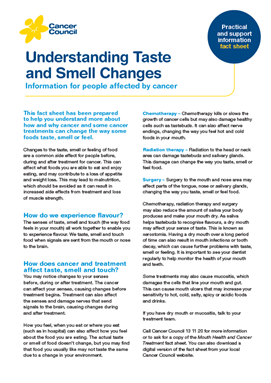- Home
- Cancer Information
- Living well
- Nutrition and cancer
- Treatment side effects and nutrition
- Loss of appetite
Loss of appetite
Not feeling like eating is known as loss of appetite. This may happen because of the side effects of cancer itself or the treatment, such as feeling sick, not enjoying the smell of food, or worrying about the diagnosis and treatment. Loss of appetite can contribute to weight loss and malnutrition. It is important to keep trying to eat so you can maintain your weight and meet your nutrition needs.
How to manage loss of appetite
- Eat small meals every 2–3 hours during the day, and keep to a regular eating pattern rather than waiting until you’re hungry.
- Follow your appetite. It’s okay to eat what you feel like, when you feel like it, e.g. have cereal for dinner or a main meal at lunchtime. Putting on or maintaining your weight is the main focus at the moment.
- Exercise before a meal. Gentle physical activity can make you feel hungry, e.g. take a short walk around the block.
- Use a smaller plate. A big plate of food may put you off eating.
- Add extra energy to your food with butter, cream, cheese and sour cream.
- Choose fluids that are high in kilojoules and protein, such as milk, milkshakes, smoothies or creamy soup. These may be easier to manage than a meal.
- Make mealtimes more enjoyable by setting the table, playing music or eating with someone.
- Manage side effects that may be affecting your appetite – see this section for tips on coping with loss of smell and taste, dry mouth, mouth sores, nausea and vomiting, and fatigue.
→ READ MORE: Managing reflux (indigestion, heartburn)
Podcast: Appetite Loss and Nausea
Listen to more episodes from our podcast for people affected by cancer
More resources
Jacqueline Baker, Senior Oncology Dietitian, Chris O’Brien Lifehouse, NSW; Lauren Atkins, Advanced Accredited Practising Dietitian, OnCore Nutrition, VIC; Dr Tsien Fua, Head and Neck Radiation Oncology Specialist, Peter MacCallum Cancer Centre, VIC; Rosemerry Hodgkin, 13 11 20 Consultant, Cancer Council WA; Clare Hughes, Manager, Nutrition Unit, Cancer Council NSW; John Spurr, Consumer; Emma Vale, Senior Dietitian, GenesisCare, SA; David Wood, Consumer.
View the Cancer Council NSW editorial policy.
View all publications or call 13 11 20 for free printed copies.
Need to talk?
Support services
Exercise and cancer
Exercise has many benefits both during and after cancer treatment, helping with side effects, speeding up recovery, and improving quality of life
Looking for transport, accommodation or home help?
Practical advice and support during and after treatment
Cancer information
Relaxation and meditation
Learn how relaxation and meditation can help you both during and after cancer treatment, or listen to our relaxation and meditation podcast
Cancer treatment
Learn about the different treatments that are used to treat cancer, such as surgery, chemotherapy, radiation therapy and targeted therapy

